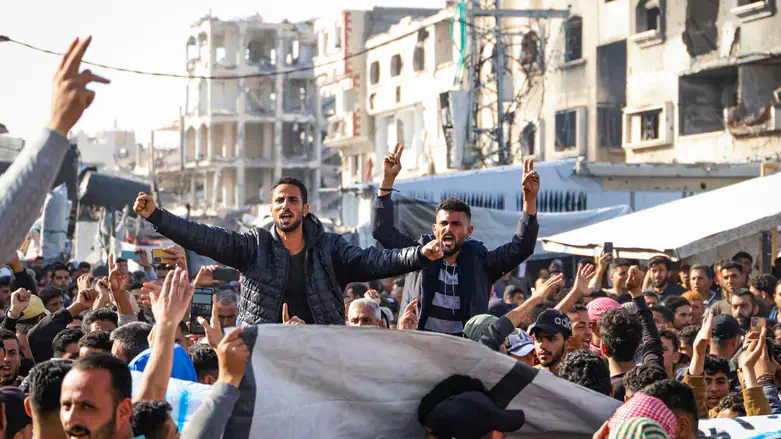
What can we learn, if we can learn anything at all, from the demonstrations in Gaza against Hamas? Is this an authentic sign of civil unrest against an authoritarian regime, or is it a staged attempt by Hamas to present an image of tolerance and democracy? We spoke about this with Oded Eilam, a senior researcher at the Jerusalem Center for Security and Foreign Affairs and former head of the Counter-Terrorism Division in the Mossad.
"You can say that it's both," says Eilam. "On the one hand, there is an authentic element, mainly because of the military pressure that Israel is again applying. The Gazans have gotten used to a time of relative quiet, especially during Ramadan, which leads to a certain feeling of well-being with tables full of good things. However, the end of the humanitarian aid, even if there isn't a total shortage, since a lot of supplies are in Hamas's storehouses, there has been an increase in food prices and a feeling of distress on the Gazan street."
This being said, Eilam stressed, "There isn't suddenly support for Israel. An authentic survey will find that most of the population supports the idea of resistance, Jihad, and Hamas. Only a few would condemn the October 7th Massacre morally or religiously. At most, they will complain about the result - the destruction of Gaza and the consequences of the war. And yet, there is the beginning of a recognition that the current situation is a dead end. The Gazan public hears the Arab League, which associates the reconstruction of Gaza to the weakening of Hamas and notices the weakness of the organization which has been hit hard and is unsuccessful at terrorizing as it has in the past."
Eilam notes that Hamas has an internal unit for oppression, like the Gestapo of Nazi Germany, which aims to deal with collaborators, political opponents, looters, and even demonstrators. "The members of this unit have not yet operated completely but are expected to deal with the protesters. It is unclear if it will be effective, but it is a real threat to the protest movement."
Despite the dangers, Eilam believes that Israel must openly declare support for the protesters: "There are those in the government and military who believe that Israel must avoid getting involved so that the protesters aren't seen as collaborators. That is a severe mistake. Israel must adopt a clear stance: 'We are with you.' We can not repeat Obama's mistake when he didn't support the protesters in Iran in 2009. If there had been outside involvement, the Iranian regime may have fallen. Today, too, Israel can and must signal, through diplomatic, media, and secret means, that it supports the protesters."
Eilam stresses that he is not naive about the possible change in the Gazan public's perception: "They will continue to hate us, but opportunism will win. Therefore, we have to encourage this uprising from Beit Lahia to Rafah. This is likely a one-time chance that will disappear within two weeks if it doesn't get outside support. Hamas is likely to suppress it violently, by shooting at their knees as the Iranians did or as Edogan is doing now against the protesters in Turkey."
Eilam also notes that social media in Gaza, as well as Al Jazeera, present the protests in a skewed manner. They describe them as protests against the war in general and not as opposition to Hamas rule. "In the face of this trend," Eilam says, "We need to give international legitimacy to the protest, to echo it, and to strengthen it, both covertly and overtly - to sway the public to a wider movement."
In a military sense, Eilam adds that the more Israel escalates its actions against Hamas leadership and shows the weakness of the leadership in Gaza, the chance that the Gazans would dare to protest will grow. "The elimination of key figures impacts the hesitation of the simple civilian. The more he sees the Hamas leadership falling apart, the easier it will be for him to overcome the fear and join [the protests]. This military action has clear civilian and political value as well."
